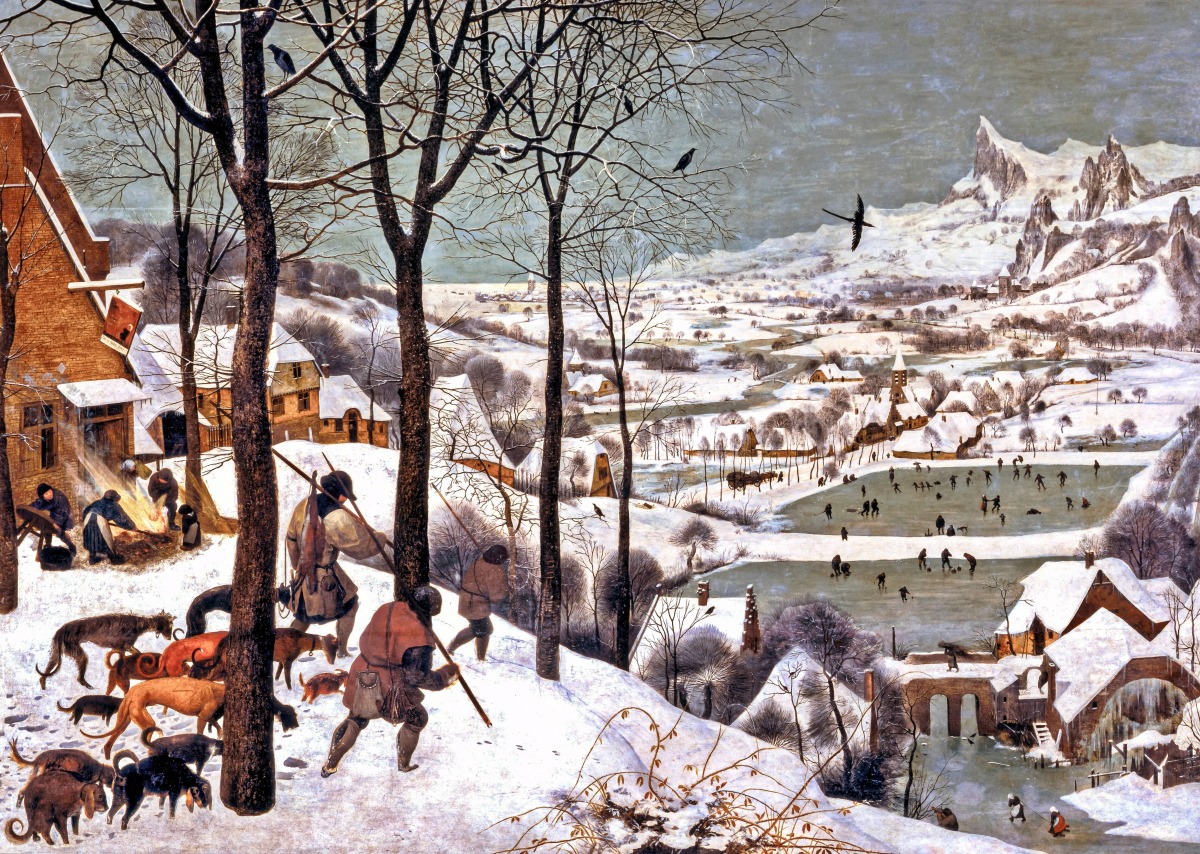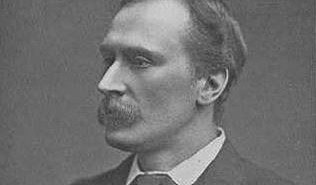I was so tired, Tuesday night. Don’t sleep well when I get that tired. I have obsessive dreams and wake up later than usual. And sleeping in always makes my head hurt. I was clumsy tired, where you bump into things; and getting into bed, I whacked it. The big clunky picture frame hanging over my headboard.
I like the picture a lot. That’s why I put it there. Bruegel’s Hunters in the Snow, it looks so cold and ancient, a somber blackish sky, intrepid hunters with their intrepid dogs, and the polder lakes below dotted by tiny skaters. On hot August nights I switch on the lamp, look at it, and feel cold enough to sleep.
But Tuesday night, hanging there, that painting wasn’t a positive presence. I hit my head on it. Which hurt until I fell asleep. And in my sleep, how aware I was of this thing dangling! Over me. Waiting to drop, and in the process, dash my brains out. Quite a long time ago, while I was away from home, a wooden bracket, bearing a ceramic vase, tumbled on to my sleeping head, and that incident is probably what made me so preoccupied by the painting. Much later, in a dopey semi-consciousness, I began groping at the wall above my head, trying to protect myself from the picture’s pointy frame.
Of course, I only managed to whack it again, so hard it swung wildly on the nail, and suddenly I was wide awake. Something cold had fallen on my neck.
I pawed the wet substance off: crystalline, frigid, and unmistakable. Put some in my mouth. Snow. In a sealed bedroom. In May. Wallowing upright, I clutched the side of my neck where the last tiny flakes were with every instant turning to water, and reached for the lamp. In its gift of sight, I looked left, right, up, and down, finding no possible source for the little flurry, until I became aware of an icy draught behind my shoulders.
Twisting round, I discovered, with a glee I only hope to feel again at Resurrection, that the draught was puffing out of the Brueghel picture.
The inner edges of the frame were furred with hoarfrost, and on the carved outer face of the lower frame, slush fused into bright drops from the room’s warmth, remnants of the snow-flinging disturbance that had awakened me. I was now aware of a curious low, broken whistling that I mistook at first for wind. Then a sharp little bark undeceived me. It was in miniature, the far-off baying of those hunting dogs. The three dark figures of hunters, against white snow, moved with hampered steps, leaving profound footprints, to the brow of a steep foreground hill, and in their descent slowly disappeared, followed by their entire pack of restless dogs, whose howls and deep barks diminished. The party left only churned, dirty snow. My gaze sought other figures, distant peasants around a bonfire in the left mid-ground; they moved rhythmically, poking at the blaze, sometimes pausing to hold hands toward it. I could just hear their minute voices in sporadic, unintelligible exchanges, by leaning very near the frame. On the far-removed polder lakes, skaters rotated, flailed, traversed the slate-grey ice in total silence.
My first wild yearning was to climb into it. This proved undoable: the cold breathing from the frame was so intense, it had me goose-fleshed in my underwear; and its frame was too small to admit me, unless I broke it. Somehow, I feared losing the whole scene if I did that. My second instinct was to tell some other human what was happening, make someone else believe it, so that I could. There was no second thought as to whom I would tell: my high-school art instructor, Dick Carey.
Enthusiastic, but an astute reasoner, good-natured enough to answer the phone in the middle of the night, he was batty about the Flemish Masters, and also the man who had introduced me to Bruegel. I still had his number. Feeling for it in my jeans, I pulled my cell phone from a pocket.
“Hello?” He didn’t sound sleepy at all. Probably up reading art criticism at this unearthly hour.
“Hi, Mr. Carey?” (I’ll never have the gall to call him Dick.) “I’m sorry to disturb you so late. Something weird has happened. With a Bruegel painting.” There, now I had him. He didn’t interrupt me once as I described the phenomenon.
“Mr. Carey, did this… I’m not pulling your leg. Have I ever pulled your leg before? Is this happening? Is this real?”
I heard that little rumble in his chest. Anyone who’s ever been in his classes knows that that rumble means an avalanche is coming, an avalanche of rock-like reasoning and information. I held the phone tight to my head, feeling glad. And warmer.
“You wonder if that can be happening. You’re not the only one of us who’s wondered! You’re questioning empirically what I’ve questioned in the abstract for decades. But you’re the only one still wondering. Listen. Bruegel was a realist, a representationalist. I’ve always respected them most, always will. Shakespeare said the purpose of art is to show reality to itself, “Hold up the very mirror,” of reality. He did it so well, his work is still blurring the line between representation and reality, people are still literally living his work in order to touch and understand life itself! Now, Bruegel… he’s a kind of Shakespeare, I’ve always maintained that. Not just because they were contemporaries. The work of a realist, listen, is to reproduce life, more accurately, and more accurately, and always more accurately. The mistake of art criticism is to suppose the process endless, with infinite space for improvement. But, technically, it has to be finite. That’s what I figured out. There is an end to that quest, anyone can see, the goal is reality itself. Now, if such huge strides can be made toward that goal, like the stride between say, late Medieval manuscript illuminations, and Bruegel, think about that contrast! Do you realize that the stride between Bruegel and reality itself, is smaller?”
I felt quivery and shaky, the more so because this thing behind my back was still exhaling below-zero air at me. “Why… Why is it happening to me?”
“Ha! Because… If you were a Polynesian who’d never seen either snow or people in full clothes, would you believe Hunters in the Snow depicts something real? Probably not. Recognizing realism in art has a huge component of belief. Now you, you’ve lived with that painting for years, you say, and it’s become internalized with you, love is the first part of belief… and now, in a state of impaired consciousness, you encounter it again, and wham, your defenses are down, you believe, and Bruegel, the last person to believe it, finally has a successor, an understander, and his vision is seen.”
“Th-thanks,” I breathed. “Mr. Carey… if you’ll excuse me, I want to be alone with it.”
“I understand. Wish I was you. It’s alright. I’ll see Bruegel one day.”
But when I was alone, I was afraid to turn around and face it again.
Every waft of cold on my back was joy. How could this be! How marvelous!
… But why was I so happy? What did this mean, for me, or anyone? A great barrier had been crossed. But what barrier? And was its crossing a good thing?
What barrier, but that mankind had never been able to create before, only manipulate the already-created. Now a man with a marten-hair brush had removed a thought from his head, and look, the thought was real; not an imagined form transferred to preexisting objects, but the imagined objects, themselves, stood in the round.
Previously, only God could do that.
‘Well, they used to say angels were the only rational creatures that fly, and now people can fly,’ I said to myself. ‘That was a good thing. And this is a good thing.’
But this was a different thing.
‘A barrier is broken. The realists, in every form of art, have been trying to break it since time began. Now it’s broken, and… what does it mean? Are we any nearer to the fulfillment of every wish?’
But wishes could be divided, I thought, into two types—wishes that were part of maintaining life in the body, and wishes for the thing that made life worthwhile. Wishes to live, and when alive, wishes for love. And no earthly love could ever meet all those wishes, that was why people became religious. And this thing behind me, spewing cold air, was not a direct path to the end of all wishes, but a round path going nowhere: because it did not go to the God they say is love, but bypassed him. Man could create.
I pulled the blanket over my head, to protect myself from that kind of cold.
I woke up late, and my head hurt from sleeping in. Behind me on the wall was a somber, dingy old print of a flat painting, with flyspecks on the snow. I grabbed the cell phone and looked through Recent Calls.
No outgoing call to Dick Carey last night. Of course not. Carey had been dead five years.
Te Deum Laudamus.
Featured Image: Pieter Bruegel the Elder – Hunters in the Snow




